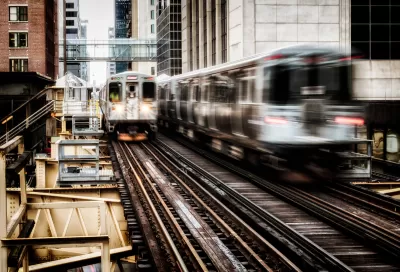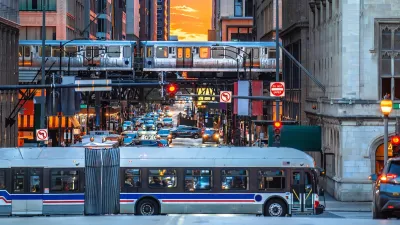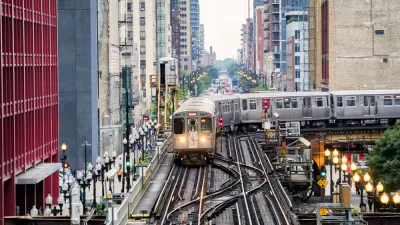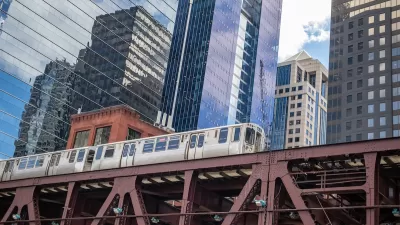A report makes recommendations for closing the region’s transit funding gap and improving service frequency and reliability.

A report from the Chicago Metropolitan Agency for Planning will advise state lawmakers on changes proposed to the region’s transit system to stave off the impending $730 million budget shortfall and bring back ridership.
As Kaitlin Washburn explains in the Chicago Sun-Times, the report recommends raising fares, raising sales taxes, and well as improving service and offering affordable fare options. “CMAP recommends the state require the transit agencies to recalculate rates every four years based on inflation, rather than the existing irregular and sometimes dramatic fare hikes.”
Washburn adds, “Other proposals include moving to one fare system rather than the current separate ones for each agency; adding ‘transit ambassadors’ to improve safety; and improving compliance with the Americans with Disabilities Act by expanding transit options for riders with disabilities.”
The report also recommends consolidating the three regional transit agencies. “CTA, Metra and Pace now operate as separate agencies, and the Regional Transportation Authority oversees financing. CMAP’s recommendations could include keeping the three separate and strengthening RTA or combining the three under one regional agency.”
FULL STORY: Fare changes, consolidated transit agencies among the ideas to reshape Chicago-area public transportation

Study: Maui’s Plan to Convert Vacation Rentals to Long-Term Housing Could Cause Nearly $1 Billion Economic Loss
The plan would reduce visitor accommodation by 25,% resulting in 1,900 jobs lost.

North Texas Transit Leaders Tout Benefits of TOD for Growing Region
At a summit focused on transit-oriented development, policymakers discussed how North Texas’ expanded light rail system can serve as a tool for economic growth.

Using Old Oil and Gas Wells for Green Energy Storage
Penn State researchers have found that repurposing abandoned oil and gas wells for geothermal-assisted compressed-air energy storage can boost efficiency, reduce environmental risks, and support clean energy and job transitions.

Private Donations Propel Early Restoration of Palisades Playground
Los Angeles has secured over $1.3 million in private funding to restore the Pacific Palisades playground months ahead of schedule, creating a modern, accessible space that supports community healing after recent wildfires.

From Blight to Benefit: Early Results From California’s Equitable Cleanup Program
The Equitable Community Revitalization Grant (ECRG) program is reshaping brownfield redevelopment by prioritizing projects in low-income and environmental justice communities, emphasizing equity, transparency, and community benefits.

Planting Relief: Tackling Las Vegas Heat One Tree at a Time
Nevada Plants, a Las Vegas-based nonprofit, is combating the city’s extreme urban heat by giving away trees to residents in underserved neighborhoods, promoting shade, sustainability, and community health.
Urban Design for Planners 1: Software Tools
This six-course series explores essential urban design concepts using open source software and equips planners with the tools they need to participate fully in the urban design process.
Planning for Universal Design
Learn the tools for implementing Universal Design in planning regulations.
Ascent Environmental
Borough of Carlisle
Institute for Housing and Urban Development Studies (IHS)
City of Grandview
Harvard GSD Executive Education
Toledo-Lucas County Plan Commissions
Salt Lake City
NYU Wagner Graduate School of Public Service





























